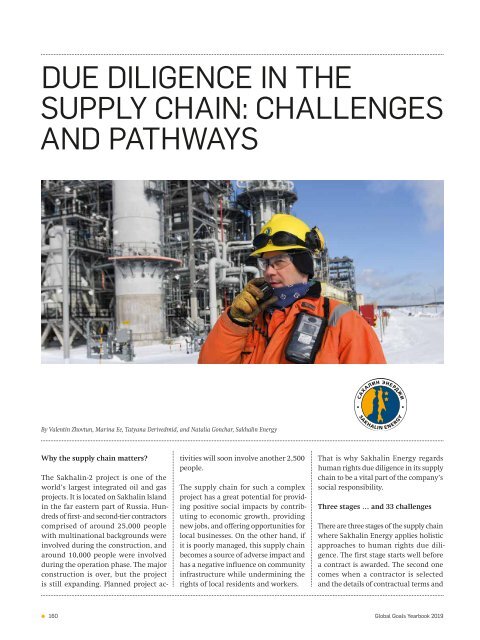Aliging Profit with Purpose - Global Goals Yearbook 2019
What are companies for? The rules for companies have changed. The focus is increasingly on their sustainable, social, and ecological impacts. The strategic orientation toward the so-called corporate purpose is decisive for profitable growth in the future. This currently results in a large number of questions for businesses: How do you find an inspiring and future-oriented corporate purpose, and how can it be aligned in such a way that it brings profitable growth and social responsibility in concert? The new 2019 edition of the Global Goals Yearbook offers answers to these crucial questions thanks to its consistent orientation toward the UN Sustainable Development Goals and a competent editorial board and author pool.
What are companies for? The rules for companies have changed. The focus is increasingly on their sustainable, social, and ecological impacts. The strategic orientation toward the so-called corporate purpose is decisive for profitable growth in the future.
This currently results in a large number of questions for businesses: How do you find an inspiring and future-oriented corporate purpose, and how can it be aligned in such a way that it brings profitable growth and social responsibility in concert? The new 2019 edition of the Global Goals Yearbook offers answers to these crucial questions thanks to its consistent orientation toward the UN Sustainable Development Goals and a competent editorial board and author pool.
Create successful ePaper yourself
Turn your PDF publications into a flip-book with our unique Google optimized e-Paper software.
DUE DILIGENCE IN THE<br />
SUPPLY CHAIN: CHALLENGES<br />
AND PATHWAYS<br />
By Valentin Zhovtun, Marina Ee, Tatyana Derivedmid, and Natalia Gonchar, Sakhalin Energy<br />
Why the supply chain matters?<br />
The Sakhalin-2 project is one of the<br />
world’s largest integrated oil and gas<br />
projects. It is located on Sakhalin Island<br />
in the far eastern part of Russia. Hundreds<br />
of first- and second-tier contractors<br />
comprised of around 25,000 people<br />
<strong>with</strong> multinational backgrounds were<br />
involved during the construction, and<br />
around 10,000 people were involved<br />
during the operation phase. The major<br />
construction is over, but the project<br />
is still expanding. Planned project activities<br />
will soon involve another 2,500<br />
people.<br />
The supply chain for such a complex<br />
project has a great potential for providing<br />
positive social impacts by contributing<br />
to economic growth, providing<br />
new jobs, and offering opportunities for<br />
local businesses. On the other hand, if<br />
it is poorly managed, this supply chain<br />
becomes a source of adverse impact and<br />
has a negative influence on community<br />
infrastructure while undermining the<br />
rights of local residents and workers.<br />
That is why Sakhalin Energy regards<br />
human rights due diligence in its supply<br />
chain to be a vital part of the company’s<br />
social responsibility.<br />
Three stages … and 33 challenges<br />
There are three stages of the supply chain<br />
where Sakhalin Energy applies holistic<br />
approaches to human rights due diligence.<br />
The first stage starts well before<br />
a contract is awarded. The second one<br />
comes when a contractor is selected<br />
and the details of contractual terms and<br />
160<br />
<strong>Global</strong> <strong>Goals</strong> <strong>Yearbook</strong> <strong>2019</strong>

















